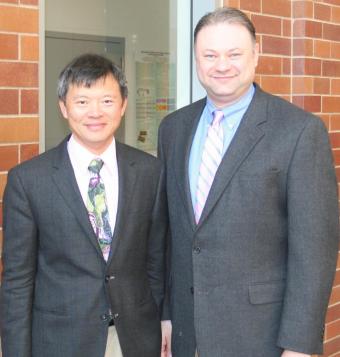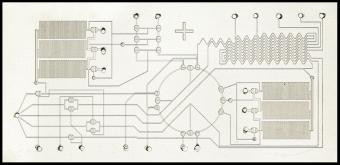New NSF Center Leverages Industry Partnerships to Improve Microfluidic Devices
 Thirteen industry partners gathered today at UC Irvine’s Samueli School of Engineering for the inaugural meeting of a newly established National Science Foundation Industry/University Cooperative Research Center (I/UCRC). The Center for Advanced Design and Manufacturing of Integrated Microfluidics (CADMIM) will develop design tools and manufacturing technologies for integrated microfluidics, also known as labs-on-a-chip. These tiny devices can be used for cost-effective, quick and easy diagnosis of problems in the environment, agriculture and human health.
Thirteen industry partners gathered today at UC Irvine’s Samueli School of Engineering for the inaugural meeting of a newly established National Science Foundation Industry/University Cooperative Research Center (I/UCRC). The Center for Advanced Design and Manufacturing of Integrated Microfluidics (CADMIM) will develop design tools and manufacturing technologies for integrated microfluidics, also known as labs-on-a-chip. These tiny devices can be used for cost-effective, quick and easy diagnosis of problems in the environment, agriculture and human health.
The mission of the center is to advance research and education on the science, engineering and applications of integrated microfluidic design and expandable production through dedicated ongoing industrial partnerships.
Much of the development of labs-on-a-chip has so far been achieved at universities, without much consideration of the materials being able to intersect with other components and existing technology infrastructure. Abraham Lee, the William Link professor and chair of the biomedical engineering department who will serve as CADMIM director and principal investigator, sees the center as a way to achieve higher levels of integration with academia and industry.
“The design of microfluidic technology has been either bottom up, driven by the academic researchers motivated by curiosity and innovation, or top down, driven by industry looking to solve problems within the current technology systems,” says Lee. “I see CADMIM being able to connect the two approaches and enabling real progress.”
Despite the many academic laboratory advances to date, few microfluidic systems have comprehensive sample-to-answer capability. CADMIM aims to develop low-power, automated, self-contained, mass-produced micro-devices capable of multi-step biochemical assessments.
The first UCI-led NSF I/UCRC on campus, the center will have two sites, UCI and the University of Cincinnati and four core faculty from each institution. University of Cincinnati’s Ian Papautsky, associate professor of electrical engineering, will serve as a CADMIM co-director.
“Our goal is to refine the functions of labs-on-a-chip to create high capacity, self-contained micro-devices that can be manufactured and deployed in a low-cost but widespread approach,” says Papautsky.
The CADMIM Industry Advisory Board, consisting of 13 members (see list below) will be chaired by David Yang, senior staff scientist at Beckman Coulter. It will meet twice a year to review and select projects to fund and evaluate those that are ongoing. The NSF provides initial administrative funds for CADMIM, with industry partners contributing a majority of the first year’s $1 million operating and research budget.
“Beckman Coulter has a long history of working with Professor Lee and his team at UC Irvine, developing a deeper understanding of the unique characteristics of micro fluidics,” says Yang. “As a member of CADMIM, we will have access to subject matter experts across the country to achieve our vision: advancing healthcare for every person.”
CADMIM Industry Advisory Board
Air Force Research Lab
ALine, Inc.
Beckman Coulter
Canon U.S. Life Sciences
Douglas Scientific
DuPont Pioneer
ESI Group
KWS SAAT AG
Monsanto
Procter & Gamble
Qiagen GmbH
ThermoFisher Scientific
Triple Ring Technologies
